|
|
|
Sort Order |
|
|
|
Items / Page
|
|
|
|
|
|
|
| Srl | Item |
| 1 |
ID:
157206
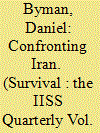

|
|
|
|
|
| Summary/Abstract |
Iran continues to sponsor a range of militant groups and has the capacity to conduct international terrorism – a problem that has bedevilled US administrations and the international community since the 1979 Islamic Revolution. Iranian terrorism is primarily a threat to US interests and allies in the Middle East: Tehran’s activities worsen civil wars and contribute to the destabilisation of the region. The threat to the US homeland and to Europe, however, remains latent, with Iran using its terrorism capability to deter Western actions and as a contingency should the United States attack Iran.
|
|
|
|
|
|
|
|
|
|
|
|
|
|
|
|
| 2 |
ID:
157201
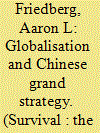

|
|
|
|
|
| Summary/Abstract |
Deng Xiaoping’s initiation of the ‘reform and opening up’ programme at the end of 1978 appears in retrospect to be the decisive turning point in the history of modern China. Increasing reliance on market forces, as opposed to state planning, and deeper integration into the global economy, in place of the old policy of self-imposed isolation and virtual autarky, launched China onto a steep growth trajectory. By any measure, economic or strategic, China’s decision to join the world has been an enormous success, raising the standard of living of hundreds of millions of people, enhancing the nation’s influence and prestige, and paving the way for its eventual re-emergence as a regional and global power on a par with the United States.
|
|
|
|
|
|
|
|
|
|
|
|
|
|
|
|
| 3 |
ID:
157209


|
|
|
|
|
| Summary/Abstract |
In 150 CE, during the reign of Emperor Antoninus Pius, the Roman Empire was at its height. It spanned over 3,500 kilometres from northern Britain to the lower Red Sea, and around 4,000km from Morocco to Syria. Rome was the first city on the planet to exceed one million inhabitants, and ruled a quarter of the world’s population. Along with Han China, the empire was one of the anchor states in a vast trading network uniting three continents. Less than three centuries later, Rome was captured and sacked, for the first time in 800 years, by a ‘barbarian’ Gothic army, and by 476 CE the western half of the empire – Britain, Gaul, Spain, Italy and North Africa – had disintegrated into a collection of Germanic kingdoms. Within two more centuries the eastern half had been reduced to just another mediaeval kingdom, a Roman Empire in name only.
|
|
|
|
|
|
|
|
|
|
|
|
|
|
|
|
| 4 |
ID:
157203
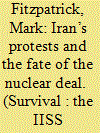

|
|
|
|
|
| Summary/Abstract |
Opponents of the 2015 Iran nuclear deal have seized on the popular protests engulfing Iranian cities as a new reason for attacking the agreement.1 It is of no relevance to them that the protesters, while angry at not seeing the promised benefits of the deal, formally known as the Joint Comprehensive Plan of Action (JCPOA), are not denouncing it or calling for foreign sanctions against Iran. The logic of the JCPOA’s opponents, rather, seems to be that, because protesters are criticising their government, foreign powers should, in solidarity, similarly attack the Tehran authorities by imposing economic penalties.
|
|
|
|
|
|
|
|
|
|
|
|
|
|
|
|
| 5 |
ID:
157205


|
|
|
|
|
| Summary/Abstract |
On 23 October 2015, the Islamic State (also known as ISIS or ISIL) broadcast a video in Hebrew for the first time, stating that the ‘real war’ against Israel ‘has not yet begun’. More than two years after that declaration, the Islamic State’s self-styled caliphate in Syria and Iraq has collapsed, and Israel remains largely untouched by the jihadi threat. Nevertheless, jihadi terrorism remains a long-term concern for countries bordering Syria and Iraq, notably Turkey, Jordan and Lebanon. Though Israel has been mostly unaffected by jihadism, it still has a de facto border with ISIS and al-Qaeda-affiliated groups, which have established fiefdoms on the Golan Heights and in northern Sinai.
|
|
|
|
|
|
|
|
|
|
|
|
|
|
|
|
| 6 |
ID:
157210
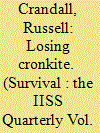

|
|
|
|
|
| Summary/Abstract |
Out of nearly 20 years of war in Vietnam, 1968, remembered for the Hanoi-led Tet Offensive, is understandably seen as America’s year of living dangerously. Less recalled by history, but perhaps equally fateful, was the year 1965. Until then, America’s stake in Vietnam had been portrayed as a secondary, even tertiary, strategic component of the global struggle against the spread of communism. Before 1965, president John F. Kennedy had insisted that Vietnam was to be their war, not ours, though he was willing to provide significant military and development assistance to president Ngo Dinh Diem’s regime, as well as military advisers. Even this limited involvement would require a swelling logistical military force as the Army of the Republic of Vietnam (ARVN) continued to struggle against a foe that proved to be more formidable than expected.
|
|
|
|
|
|
|
|
|
|
|
|
|
|
|
|
| 7 |
ID:
157208
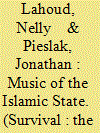

|
|
|
|
|
| Summary/Abstract |
When the animals in George Orwell’s Animal Farm concluded that their misery could be ‘summed up in a single word’, namely ‘Man’, and became resolved to ‘Remove Man from the scene’, it was a song that propelled them to revolution.1 Old Major the boar, the most highly regarded among the animals, addressed his comrades with a philosophical speech about the ‘tyranny of human beings’, going on to tell them of a dream he had had about life after the disappearance of Man. In particular, he recalled a song from the dream, ‘Beasts of England’, the lyrics of which contained ‘joyful tidings’ of a ‘golden future time’ when ‘tyrant man shall be o’erthrown’ and the fields ‘shall be trod by beasts alone’.2 The song ‘threw the animals into the wildest excitement’, much more so than Old Major’s speech had done, and before long ‘the whole farm burst out into Beasts of England in tremendous unison’.3 In short, the song forged a common bond among the animals, transcending their differences and imbuing Old Major’s plan to eradicate Man with a potency and resonance that his rhetoric had clearly lacked.
|
|
|
|
|
|
|
|
|
|
|
|
|
|
|
|
| 8 |
ID:
157207


|
|
|
|
|
| Summary/Abstract |
The recently adopted Treaty on the Prohibition of Nuclear Weapons (or the ‘ban treaty’) is not a viable legal vehicle for eliminating nuclear weapons; it does not establish international legal norms; and it might, depending on how it is implemented, do harm to existing non-proliferation efforts. Its governmental and non-governmental proponents appear to be motivated by a sincere concern for the humanitarian risks posed by nuclear weapons and a desire for speedier progress in eliminating them. But this particular text, as a legal matter, does not make a positive contribution to achieving nuclear-disarmament objectives.
|
|
|
|
|
|
|
|
|
|
|
|
|
|
|
|
| 9 |
ID:
157204


|
|
|
|
|
| Summary/Abstract |
Over the past decade or so, Pakistan has been focusing considerable energy and resources on the development of tactical nuclear weapons, most notably the Nasr short-range ballistic missile. This has been driven by the belief that India has a doctrine for rapid ground attacks into Pakistan, known as ‘Cold Start’, and that India’s capability to conduct such an operation is increasing. The strategic importance (and indeed the existence) of a Cold Start doctrine has been the subject of considerable debate; in reality, the Indian military has a wide range of options for military action against Pakistan, which probably include numerous options for ‘surgical strikes’ of varying degrees of military ambition and risk. Any Cold Start doctrine is likely seen by Delhi as an option of last resort.
|
|
|
|
|
|
|
|
|
|
|
|
|
|
|
|
| 10 |
ID:
157202
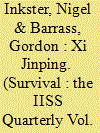

|
|
|
|
|
| Summary/Abstract |
Like his American counterpart, Chinese President Xi Jinping wants to make his country great again. But there is a crucial difference: not only does Xi have the vision, he also has a strategy, aimed at restoring the dominant regional role that China enjoyed for centuries, while pushing Chinese influence far beyond its borders and into the wider world. If he succeeds, Beijing will present most other nations with political, economic and military challenges unprecedented in modern times. And, to date, Xi’s efforts, built on those of his predecessors, have achieved remarkable gains at home and abroad.
|
|
|
|
|
|
|
|
|
|
|
|
|
|
|
|
|
|
|
|
|